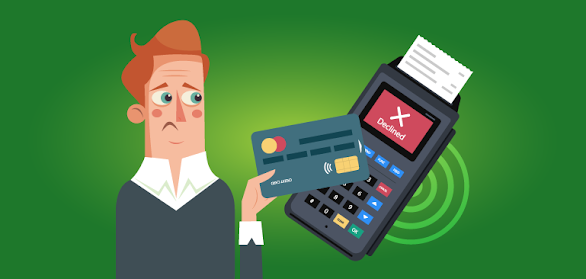Credit Card Getting Declined? How To Avoid It?
Reasons Why Credit Cards Get
Declined
Insufficient Funds:
Insufficient cash in your account is among the
most typical causes for a credit card rejection. The transaction will be denied
if you attempt to make a transaction that surpasses your credit limit or available amount. To avoid this, regularly monitor
your account balance and credit limit, and ensure they can cover your intended
purchase.
Exceeding the Credit Limit:
Every single credit card has a predetermined
credit limit. A decline will occur if you attempt to purchase within this
limit. To keep a solid credit history and prevent exceeding yourself
financially, it's important to stay under your credit limit.
Expired Card:
Credit cards have expiration dates, and using
an expired card for a transaction is a common cause of declines. Keep an eye on
the expiration date and request a replacement card from your issuer well in
advance.
Fraud Alerts:
Credit card issuers have sophisticated fraud
detection systems in place. Unusual or high-value transactions, especially in
foreign countries, can trigger a fraud alert, leading to a declined
transaction. To prevent this, inform your issuer of your travel plans or large
purchases in advance.
Technical Issues:
Sometimes, the problem is not with your card
or finances but with the payment processing system. Technical glitches, server
errors, or issues with the merchant's payment terminal can lead to declines. In
such cases, you can try the transaction again later or use an alternative
payment method.
Incorrect Information:
Incorrect payment information, such as the
card number, expiration date, or CVV code, might lead to a decline. When
completing online or in-store transactions, always double-check the information
you supply.
Tips to Avoid Credit Card Declines
Now that you know the common reasons behind
credit card declines, let's explore some practical tips to help you avoid them:
Monitor Your Account Regularly:
Pay attention on your account balance and
credit limit and set up alerts on your account to receive messages when your
balance falls below. This proactive technique might help you avoid declined
transactions due to insufficient funds.
Stay Within Your Credit Limit:
Avoid maxing out your credit card. Aim to use
only a portion of your available credit, ideally below 30% of your credit
limit. This not only prevents declines but also positively impacts your credit
score.
Update Your Card Information:
Check your card details, like the validity
date, is up to date. Most card issuers will give you a new card before the old
one expires, but you must verify and activate it.
Notify Your Issuer of Travel
Plans:
If you want to travel locally or overseas,
inform your credit card company . To avoid having your card denied due to
suspected fraud, include data about your travel dates and locations.
Double-Check Payment Details:
When making online or in-store purchases,
double-check the payment details you enter. Verify the card number, expiration
date, and CVV code to ensure accuracy.
Use an Alternative Payment
Method:
If your credit card is declined, have a backup
payment method, such as a debit card or cash. This can save you from the
inconvenience of a declined transaction, especially in urgent situations.
Pay Attention to Alerts and
Notifications:
Keep your phone and email notifications
active. Credit card issuers often send alerts for suspicious activity or
declined transactions. Being aware of these notifications can help you take
immediate action to resolve any issues.
Read More - Get More Bang for Your Buck: Maximizing Credit Card Rewards Points
Conclusion
Credit card denials can be difficult, but
recognizing why they happen and proactively avoiding them can help your
financial transactions run more smoothly and consistently. You may reduce the
risks of your credit card being refused and enjoy the ease of cashless payments
with confidence by remaining informed about the status of your card, handling
your credit responsibly, and checking payment data.




Comments
Post a Comment